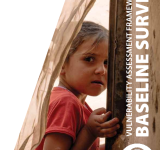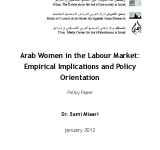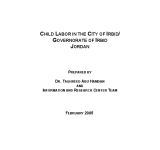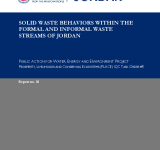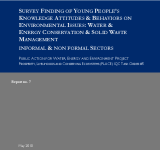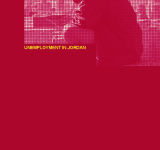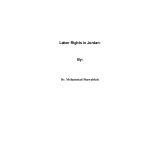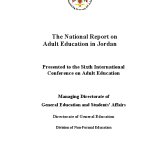informal
ترمي ورقة السياسة هذه إلى دراسة وتحليل ميزانية وزارة الصناعة والتجارة والتشغيل من منظور جندري أثنـي. وهي جزء من مشروع بحث اوسـع يدرس «الأقلية والمـرأة العربية في الموازنـة الحكومية»، ويهدف الى زيـادة
This research study aims to investigate child labor in Irbid to provide a deep understanding of and knowledge about the socio-economic and cultural context of working children in Irbid. It also aims to propose intervention programs that maximize the effectiveness of the Family and Childhood Protection Society (FCPS);; an NGO in Irbid that works on issues related to children. Various study results have shown that children often work in dangerous and hazardous conditions where they are exposed to physical and psychological abuse;; in addition to exploitation in terms of minimal pay and long working hours. Both qualitative and quantitative methodologies were used to conduct the research presented in this report. In-depth interviews and questionnaires were used to collect data from all organizations working on child-related issues and from working children and their family members.
The report studies the formal and informal waste streams in Jordan as well as the public behaviors and attitudes that influence them. The study gives a specific emphasis to discovering the “drivers” of these practices as well as barriers to change and aims to locate examples of model behavior that already exists in Jordan so that they can be encouraged and duplicated. It investigates and assesses the four areas – the general attitudes of the Jordanian population towards waste and waste disposal;; informal waste reclamation sector in Jordan;; stream of recyclable material and the formal sanitation and waste management system of Amman and Aqaba. This research was conducted as part of the Public Action for Water;; Energy and Environment Project (PAP);; which aims to encourage water and energy conservation and to support behavior change towards more conservation and efficient practices both at the household level and in the commercial;; industrial and civil society arenas using social marketing behavioral methods. The study finds that there were high levels of awareness and concern about issues such as littering and recycling but it also concludes that the lack of concern amongst the broader public was cited as one principal reasons that people were not taking action. It calls for a quantitative research to confirm Jordanian attitudes on environmental issues.
The report explores the level of knowledge;; attitudes held and practices observed by young people towards environmental issues related to water and energy conservation and sold waste management. It maps out available resources;; programs and learning opportunities in the informal and non-formal education sectors;; through which positive environmental attitudes can be encouraged and promoted. The survey of the report assess the knowledge;; attitudes and practices of young people aged 7 -24;; educations;; staff and youth workers to identify strengths and areas for improvement through capacity building and explore existing resources;; programs to evaluate their effectiveness. This research was conducted as part of the Public Action for Water;; Energy and Environment Project (PAP);; which aims to encourage water and energy conservation and to support behavior change towards more conservation and efficient practices both at the household level and in the commercial;; industrial and civil society arenas using social marketing behavioral methods. The study concludes that there is a need for more “green” programs that involve youth in a proactive way and therefore;; it recommends that programs targeting youth need to remain positive;; dynamic and in context. The recommendations of the report include development of environmental resources in the Arabic language;; the youth-led;; peer-led programs that involve participatory learning opportunities;; and social media tools to raise interests;; awareness and creation of environmental education task force.
This pilot study report was initiated by the European Training Foundation (ETF);; in close cooperation with the National Center for Human Resources Development (NCHRD) in Jordan;; in the framework of the ETF multiannual project Observatory Function Development in Jordan. The focus of this report is unemployment. However;; considering that unemployment information in itself should not be used or analysed in isolation from other indicators or data;; the report begins by providing an overview of the general labour market situation in Jordan. After the main data on employment by sector;; age;; gender and level of education are presented;; on the basis of the available information;; the specific cases of non-Jordanian employees and employment in the informal economy are highlighted as topics requiring special attention in the Jordanian labour market. In conclusion;; two groups of recommendations are proposed: (i) technical recommendations to main information providers for improving the quality of the information collected;; and (ii) a set of policy recommendations for tackling unemployment. These recommendations are intended to support policymakers in their commitment and willingness to adapt both the formal and informal education and training system and the whole labour market in Jordan.
This paper aims at shedding light on the labor rights in Jordan;; particularly for those who are working in the informal sector;; through identifying the factors that impede them from enjoying such rights and;; thus;; coming up with the appropriate recommendations in this area.
This national report on Adult Education in Jordan;; is a report presented to the Sixth International Conference on Adult Education. It presents Jordanian educational legislation;; strategies;; policies and laws as well as educational projects and programs. The main theme of this report is the right of education.
